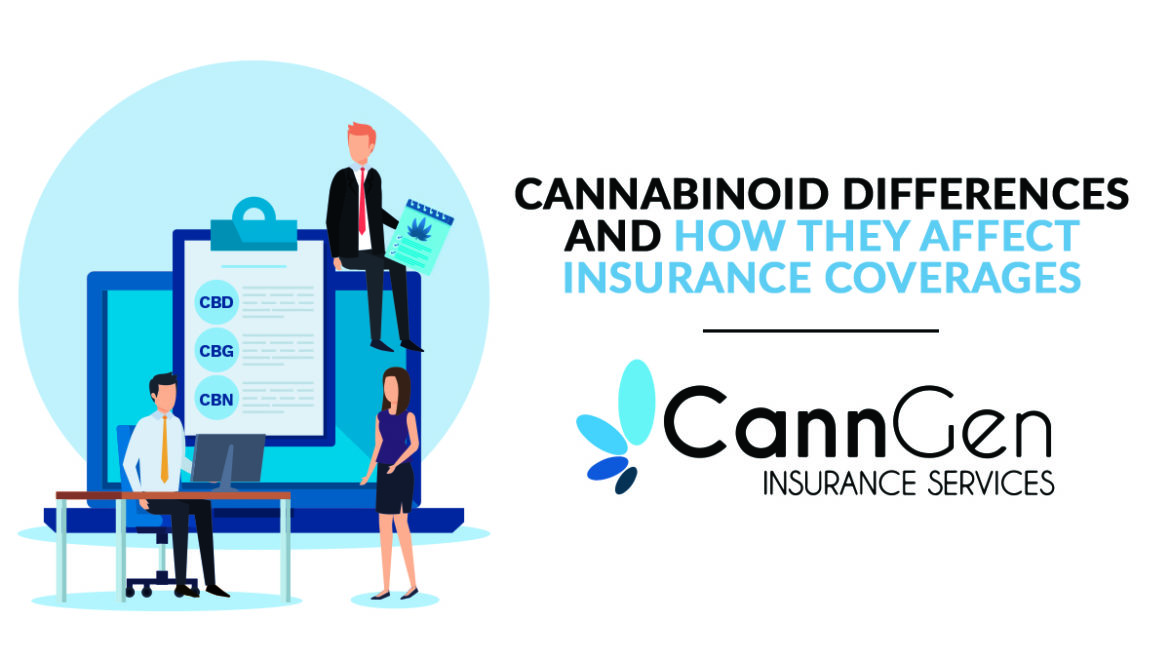
Cannabinoid Differences and How They Affect Insurance Coverages
You work hard to build your business, so you want to make sure it is protected when the unexpected happens. Yet, with all the legal uncertainty surrounding cannabis products in the U.S., how can you be sure the insurance coverage you need is available to your business?
The truth is that the cannabinoids present in your products and the plant from which they are sourced can have an impact on whether or not you can secure your business with an insurance policy.
What are Cannabinoids?
When discussing cannabinoids, it is important to recognize that this category includes both endocannabinoids (made in the body) and phytocannabinoids (made by plants). Cannabinoids can also be created synthetically in labs, but this is less common.
Endocannabinoids are made naturally in the human body as part of the endocannabinoid system. They work as neurotransmitters affecting a number of physiological processes in order to help the body maintain homeostasis or a healthy balance.
Phytocannabinoids are created by plants like cannabis and hemp. When consumed, these phytocannabinoids, which are similar in structure to endocannabinoids, interact with the endocannabinoid system, resulting in a wide range of effects.
It is these phytocannabinoids that make high-THC medical and recreational marijuana and CBD so valuable as consumer products.
Regulatory Differences for Cannabinoids
There is a ton of regulatory grey area surrounding cannabinoids, and what is legal in one market may not be legal in another. Generally speaking, the source of a cannabinoid has the biggest impact on its legal status.
CBD
Also known as cannabidiol, CBD is commonly derived from hemp, allowing it to be sold nationally as part of the health and wellness market as long as the THC levels in the hemp product are 0.3% or lower.
CBD can also be extracted from high THC marijuana plants. Often containing a ratio of THC higher than 0.3%, CBD products extracted from marijuana are not federally legal and can be sold only through dispensaries in legal marijuana states.
THC
When THC is discussed, it is almost always delta-9-tetrahydrocannabinol, the potent form of THC found in abundance in marijuana plants. THC is famously the cannabinoid that produces euphoric or “high” sensations. The Drug Enforcement Administration (DEA) continues to list marijuana (and specifically THC) as a Schedule I drug, making it illegal at the national level. However, THC and marijuana have been legalized at the state level for both medical and recreational use in dozens of markets.
Delta-8
A less potent version of delta-9 THC that can be processed from the hemp plant, delta-8 THC is seen as a nationally available alternative to high-THC marijuana. Currently, delta-8 THC exists in a regulatory grey area. While advocates claim that, because it can be derived from hemp, delta-8 THC is protected under hemp’s legalization in the 2018 Farm Bill, the DEA considers all forms of THC to be illegal. For this reason, it can be difficult to secure insurance coverage for delta-8 THC products. Learn more about delta-8 THC here.
Minor Cannabinoids
In addition to the cannabinoids listed above, there are numerous other cannabinoids (over 100) present in hemp and marijuana plants. Most often, these cannabinoids occur in trace amounts and so they are usually considered a natural part of either the hemp or marijuana plant and would be regulated accordingly.
Can I Insure All Cannabinoid Products?
Businesses involved in the cultivation, processing, manufacturing, distribution, and retail of products containing CBD can be protected under common cannabis insurance policies. This is also true of THC products when sold within a legal medical or recreational marijuana market. CannGen partners with a wide range of cannabis and hemp CBD companies to provide comprehensive coverage that is tailored to the exact needs of each individual business.
However, not all cannabinoids can be covered by insurance policies. For example, the regulatory uncertainty surrounding delta-8 THC means it is difficult to get coverage under most policies. CannGen does not extend coverage for delta-8 THC at this time.
Reach out to CannGen here to see what coverages are right for your unique business.
More Cannabis Industry News
Want to stay up to date on the latest? You can find more on important topics in the cannabis industry on our blog.
Or get more information about comprehensive insurance solutions for the cannabis, CBD, and hemp industries from CannGen here.
Disclaimer: Information shared is for general purposes only.


 US
US
 US
US
 CA
CA
 EU
EU
